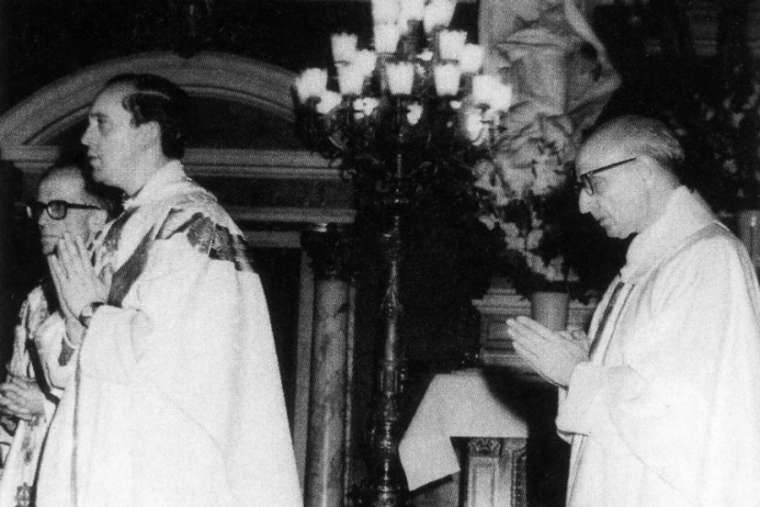Beatification cause opens for Jesuit Pedro Arrupe, early mentor to Pope Francis
A cause has begun in the Diocese of Rome for the beatification of Fr. Pedro Arrupe SJ, former superior general of the Society of Jesus.
Jul 15, 2018

By Elise Harris
A cause has begun in the Diocese of Rome for the beatification of Fr. Pedro Arrupe SJ, former superior general of the Society of Jesus. The priest, who served as a mentor to the future Pope Francis, was a controversial figure within the Society of Jesus.
Jesuit Father General Fr. Arturo Sosa announced Arrupe’s cause at a meeting in Bilbao, Spain with some 300 Jesuits and lay associates involved with the International Association of Jesuit Universities.
The news was confirmed to CNA by the communications director for the Jesuit Curia in Rome, Fr. Patrick Mulemi, who said the cause is “has been opened,” but has just begun. “We are right at the beginning of the process,” he said, explaining that the Jesuits will follow the same procedure as any other cause.
Born in Spain in 1907, Arrupe served as superior general for the Society of Jesus from 1965-1983, leading the order through the aftermath of the Second Vatican Council. During that time, he also served three consecutive terms as president of the Union of Religious Superiors General, from 1967-1982.
According to papal biographer Austen Ivereigh, who wrote the widely read biography of Pope Francis, “The Great Reformer,” Arrupe and then-Fr. Bergoglio “had a very good and close relationship, and Bergoglio saw him as a spiritual father, he enormously admired him and was inspired by him.”
It was Arrupe who appointed Bergoglio the Jesuit provincial of Argentina in 1973, and the two remained close. The made a joint-visit to the Diocese of La Rioja to support Bishop Enrique Ángel Angelelli Carletti, who was assassinated in 1976 during Argentina's Dirty War.
Arrupe entered the Society of Jesus in 1927 after studying medicine. After the order was expelled from Spain in 1932, he went to study in Belgium, the Netherlands and the United States as part of his formation before being ordained a priest.
He was ordained in 1936 and obtained a degree in medical ethics before being sent to Japan in 1938 to work as a missionary. While abroad, he became the master of novices for the Jesuit novitiate in Japan, and was living in Hiroshima when the U.S. dropped the atomic bomb on Aug. 6, 1945.
With his history in medicine, the young priest converted the novitiate into a makeshift hospital for the wounded. A decade later, in 1958, he was named the first provincial for Japan, overseeing all Jesuits who lived in the country.
Arrupe held the position until May 1965, when he was elected Father General of the Jesuits during the 31st General Congregation of the Society of Jesus, just six months before the closing of the Second Vatican Council.
After the council, the Jesuits, who were the largest religious order in the world at the time, shifted focus and embraced a more social-justice oriented approach to their apostolic work, under Arrupe’s direction.
During the order's 1974-75 32nd general congregation, Arrupe passed a number of new decrees, including one titled: “Our Mission Today: The Service of Faith and the Promotion of Justice,” which focused heavily on social justice issues and became a blueprint for the Society’s direction.
Arrupe's changes were met with opposition by many Jesuits, and under his leadership, the order clashed with Pope Paul VI and other Vatican and ecclesial figures.
In 1973, Pope Paul VI issued a warning to Arrupe about experimentation in the Society of Jesus. Six years later, Pope John Paul II accused the Jesuit leadership of “causing confusion among the Christian people and anxieties to the church and also personally to the Pope,” criticizing in particular “secularizing tendencies” and “doctrinal unorthodoxy” within the order.
Arrupe acknowledged issues within the Society of Jesus, and made efforts to reprimand some priests accused of public doctrinal deviances. Some in the order questioned whether he should have made systemic changes in responses to papal criticism, rather than issuing individual corrections.
Arrupe, Ivereigh said, “held [Bergoglio] in high esteem, he trusted him.”
As for the future pope, Ivereigh said Bergoglio was “unquestionably” influenced by Arrupe's leadership, and often cited his former superior general in speeches.
“Arrupe was something of a model for Francis,” the biographer said, explaining that the main threads of similarity between the two were not only a shared concern for the poor, but also their approach to modernity, believing that what was needed was “an engagement” between faith and the modern world.
“Not to reject modernity, but to discern what was good, what was threatening to the Gospel, and what wasn't. I think that was Arrupe's big thing, rather than being in this constant confrontation with the modern world, to have a dialogue with it,” Ivereigh said.
After suffering a stroke in 1981, Arrupe resigned as superior general of the order and recommended American Jesuit Vincent O’Keefe take his place. However in a move some perceived as a rebuke, Pope John Paul II appointed Jesuits Paola Dezza and Giuseppe Pittau to oversee the society until a new leader was elected.
During the September 1983 general congregation, Peter-Hans Kolvenbach, S.J., was elected as the new minister general, a position he held until 2008, when he resigned and was succeeded by Fr. Adolfo Nicolas.
Arrupe died Feb. 5, 1991.--CNA







Total Comments:0